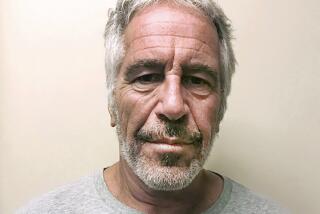Wall Street Settlement May Omit Deutsche
- Share via
NEW YORK — Deutsche Bank is likely to become the second Wall Street investment firm to be dropped from an expected industrywide settlement of stock analyst probes after acknowledging that it had not turned over all the evidence demanded months earlier by government investigators.
The New York-based arm of the giant German bank failed to deliver electronic tapes containing scores of e-mail messages sought by securities regulators from California and the federal government, The Times learned late Thursday.
Deutsche blamed the missing e-mails on a computer problem, said Andre Pineda, deputy director of the California Department of Corporations, which along with the Securities and Exchange Commission is investigating Deutsche.
The development could prevent Deutsche from joining 10 other investment banks in a final settlement of the probes that is expected to be announced in the next few weeks.
“We’re all in agreement that the timing of the settlement with Deutsche Bank will have to be different than with the other parties,” Pineda said.
The larger deal with the other brokerages won’t be derailed or postponed, sources familiar with the settlement talks said.
Until this week, Deutsche had been expected to pay $80 million as part of Wall Street’s total tab of $1.4 billion to resolve the probes into alleged conflicts of interest among stock analysts. It is unclear how the Deutsche case will proceed until regulators comb through the additional e-mails.
However, because the bank already was set to resolve its probe, a separate settlement at a later date would be likely as long as the additional e-mails do not reveal new evidence of analyst wrongdoing.
“This was an inadvertent omission,” Deutsche said in a statement Thursday night. “We immediately informed the regulators and are cooperating fully to provide them with the additional information.”
Earlier this week, The Times reported that San Francisco-based Thomas Weisel Partners would not take part in the so-called global settlement because it had reached an impasse in negotiations with regulators.
The Deutsche development is the latest twist in what has been an historic, though at times unorthodox, examination of wrongdoing on Wall Street during the 1990s bull market. The probes have focused on whether analysts hyped stocks solely to gain investment banking business for their firms.
Though the Deutsche statement indicated that the firm had discovered the e-mail issue, Pineda said the problem came to light because of intense grilling from California regulators
Based on apparent gaps in the e-mail strings it had received, California had long suspected that e-mails were missing, Pineda said. During a call with California officials last Friday, an employee in Deutsche’s technology department acknowledged that some messages may not have been handed over to investigators, Pineda said.
“All along, there were suggestions that there were gaps, but nothing we could be sure of,” Pineda said.His office is expecting new electronic materials from Deutsche, Pineda said.
“They’re promising they’ll get in all of it now,” he said, adding that he has “no clue at all” how long it will take to go through the additional material.
The government announced in December that it had reached a tentative deal with the firms to wrap up their probes. But the two sides have been haggling ever since about the exact terms of the deal and the final wording of settlement documents.
The firms are worried that a toughly written settlement, combined with an extensive release of potentially incriminating e-mails and other documents, could weaken their hand in a series of private lawsuits brought by aggrieved investors.
Nevertheless, three firms -- Citigroup Inc., Credit Suisse Group’s Credit Suisse First Boston and Merrill Lynch & Co. -- will be accused of securities fraud in the settlement, according to a person familiar with the matter.
Firms typically neither admit nor deny guilt in such regulatory settlements. Nevertheless, fraud allegations can give a boost to private plaintiffs, lawyers have said.
Representatives of the three firms declined to comment Thursday.
More to Read
Inside the business of entertainment
The Wide Shot brings you news, analysis and insights on everything from streaming wars to production — and what it all means for the future.
You may occasionally receive promotional content from the Los Angeles Times.











